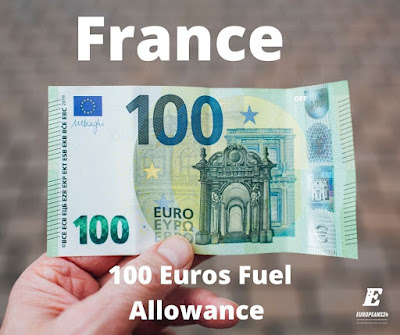Prime Minister Jean Castex's announced of a 100-euro inflation compensation on Thursday.
Based on calculations, the administration concludes that the "inflation allowance" of 100 euros will cover the increased expense associated with the increase in gas prices. The account for the group "40 million motorists" does not exist.
Is it too little or too much? Prime Minister Jean Castex's announcement of a 100-euro inflation compensation on Thursday evening raises a lot of problems. In the following weeks, around 38 million French citizens should be able to benefit from it.
What, Bercy guarantees, will enable them to cope with the increased costs incurred as a result of the increase in gas prices at the pump. Last week, the latter gained another 2 cents, reaching historic highs of 1.56 euros a liter for diesel and 1.62 euros for unleaded gasoline. But, if that's the case, what's the significance of the sum of 100 euros?
On Thursday evening, Jean Castex gave a schematic explanation. Based on a 9-cent-per-liter increase in pump prices during the year (relative to average prices for 2018-2019) and a 14,000-kilometer average distance traveled by the French, the additional cost would be around 80 euros. An sum thus covered by this 100 euros, with the remainder used to cover other inflation-related expenditures (energy, food, etc.).
According to Bercy's more comprehensive calculations, this figure of 100 euros would likewise be best suited to the most frequent usage, depending on the kind of family and the use of automobiles. For example, "an average motorized household" traveling 12,818 kilometers over the course of the year will spend 1,752 euros (based on average pricing for 2018-2019) and so incur an additional cost of 108 euros this year.
Another example is the self-employed "large wheeler" who drives his diesel truck 80 kilometers each day five days a week. With 21,500 kilometers used over the course of the year, the latter will spend 1,300 euros on gasoline, plus an additional 81 euros for the present rise. The 100 euros would compensate once more.
Bercy also uses the example of a single-parent household with a civil servant parent who drives a diesel minivan and drops off and picks up their children every day from school 3 kilometers away before driving 7 kilometers to their workplace. At 6,000 kilometers per year, this residence will spend 642 euros over the course of the year, plus an additional 40 euros. Or, at the very least, substantially less than the inflation allowance.
According to some experts, the amount decided by the administration will assist cover a significant portion of this year's increase in gas costs. It should also assist those with the lowest earnings, who have benefitted from the minimum wage hike.
"In France, an increase in the minimum wage and a reduction in average automobile fuel usage have countered an increase in the price of a liter of diesel. In October 2021, the cost of traveling 100 kilometers as a proportion of the minimum salary remains lower than previous records," says Eric Dor, director of economic research at the IESEG School of Management in Paris, in a statement shared on Twitter.
And it's worth noting that the cost of fuel to go 100 kilometers in a diesel automobile this month is equal to 90.57 percent of the hourly minimum wage. "It's still a long way from the 93.38 percent in October 2018, the 100.02 percent in April 2012, or the 112 percent in July 2008," he says. Taking everything into account, the 100-euro compensation issued on Thursday evening isn't even warranted.
In contrast, the account for the group "40 million motorists" does not exist. "In reality, taking into account the typical consumption and mileage of the French, motorists are presently incurring an annual extra expense of between € 104 and € 127," laments its delegate general Pierre Chasseray.
"And, again, in the regions, where we are most reliant on automobiles, it is not unusual to drive more than 20,000 kilometers each year." "All of these rural-dwelling French individuals pay roughly € 160 extra to refuel."
"Of the 100 euros supplied by the government and spent on petrol by motorists, 60 euros will return straight to the public coffers in the form of taxes," the group said in a news statement. And to ask once more for a VAT decrease from 20% to 5.5 percent, "just like gas and electricity."

